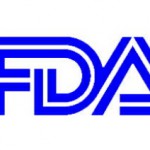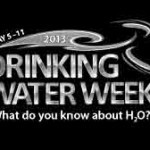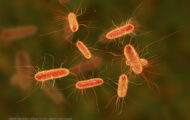The Colorado Department of Public Health and Environment has issued a health advisory and is advising residents to avoid contact with rivers and streams after massive flooding followed heavy rains this week. Rivers and streams may be contaminated with partially treated sewage and other wastewater because of power failures and damage to wastewater treatment systems. Keep out of rivers and streams in northeastern Colorado under further notice. The affected counties include Adams, Boulder, Broomfield, Larimer, Morgan, Logan, Sedgwick and Weld. Don't let children or pets play in the water, or to play with toys that have been in contact with the water. Wash hands frequently with soap and clean warm water. If you have been in contact with the water and experience diarrhea or vomiting, see … [Read more...]
Outbreaks Associated with Drinking Water in the U.S.
Those of us in the United States tend to think of illnesses caused by drinking water as a third world problem. But believe it or not, people in the United States are getting sick after consuming water from public treated systems. The MMWR news synopsis for September 5, 2013 reports that contamination of untreated ground water in public water systems and private wells, Legionella in building plumbing systems, and deficiencies in the public drinking water infrastructure are all causes of illness. The number of outbreaks in the federally regulated portions of public water systems has declined. But when these outbreaks occur, they sicken many people because so many use water from the tap. During 2009-2010, the latest year for which finalized numbers are available, there were 33 … [Read more...]
E. coli O157:H7 Illnesses Linked to Swimming in Lake Minnetonka
Three cases of E. coli O157:H7 illness in Minnesotans linked to swimming in the Big Island area of Lake Minnetonka, according to the Minnesota Department of Health (MDH). All three cases of E. coli O157:H7 infection have the same DNA fingerprint. One person was hospitalized but has since recovered. The connection to Lake Minnetonka was found after investigators questioned those sickened. All of the cases reported swimming and boating on July 4, 2013, in the Big Island area of Lake Minnetonka. The image is courtesy the Star Tribune, and it shows how popular that area is with boaters. The source of the E. coli in the water is unknown. However, lakes can be contaminated through multiple methods, including animal waste, individual septic systems or sewage spills, improper boat waste … [Read more...]
Ice is Food? Yes, and the FDA Regulates it
Is ice food? Yes. Whether it's shaved, cubed, or crushed, ice is food according to the U.S. Food and Drug Administration (FDA) and it's regulated. That means, packaged ice must be produced in accordance with the agency's Current Good Manufacturing Practices in Manufacturing, Packing, or Holding Human Food. Translation? Ice manufacturers "must produce, hold, and transport ice in clean and sanitary conditions, monitor the cleanliness and hygiene of employees, use properly cleaned and maintained equipment, and use water that is safe and sanitary." During inspections, FDA investigators make sure: the plumbing design prevents contamination, the water supply is safe and sanitary, and and the facility and grounds are sanitary. Small-scale producers are exempt. Labels must also meet FDA … [Read more...]
Broward County, Florida Issues Boil Notice for E. coli in Water
Broward County has issued a boil water notice for its water customers, since E. coli has been found in the municipal system. The cities affected by this notice include the City of Dania Beach, the City of Hallandale Beach, the City of Hollywood, and Broward County WWS customers in service area 3A and 3BC. That affects parts of Dania Beach, Hollywood, Miramar, West Park, Pembroke Park, and Pembroke Pines including the Fort Lauderdale-Hollywood International Airport. Do not drink the water without boiling it first. Bring all water, including the water you use to wash your hands and use in the kitchen, to a rolling boil. Let it boil for one minute, then let it cool before using it. Bottled water can be used instead of tap water if you prefer. Only use boiled or bottled water for drinking, … [Read more...]
It’s Drinking Water Week, Get to Know Your H2O
The theme of this year’s Drinking Water Week is: What Do You Know About Your H2O? For many Americans, the answer to that question is not much, but it’s never too late to learn and it’s the goal of Drinking Water Week. Created 35 years ago by the American Water Works Association (AWWA), Drinking Water Week is a public awareness campaign that encourages consumers to think about their sources of drinking water, how they use it and how to protect it in the future. In the U.S., utilities that provide drinking water to communities are required to monitor and test it for contaminants multiple times each day and provide customers with water quality reports annually. Owners of private wells should havie their water tested periodically by a certified laboratory. Consumers can get information … [Read more...]
MN Department of Health Surveys of East Metro PFC Exposure
The Minnesota Department of Health has been studying East Metro residents' exposure to perfluorochemicals (PFCs) in a Biomonitoring Project. Drinking water was the major source of exposure to the chemical for most people. Groundwater contamination caused the problem. The first East Metro PFC Biomonitoring Project studied the levels of PFCs in the blood of 196 adults in 2008. The people lived in Oakdale, Lake Elmo, and Cottage Grove. A follow-up study in 2010 to 2011 measured the levels to see if they changed. A presentation will be given to residents on May 15, 2013, along with updates on water testing and the MDH study of PFCs in home-grown produce. The study found that participants who drank unfiltered water for more years had higher PFC blood levels. The more water a person drank, … [Read more...]
The Theme Of World Water Day 2013 Is Cooperation
A day to celebrate fresh water was recommended to the United Nations Conference on Environment and Development in 1992. Since then, World Water Day has been celebrated each year on March 22.The theme of this year’s celebration is cooperation across organizations and governments to improve access to healthy water. Since 1990, the number of people able to access improved drinking water has increased by 2 billion and the number of people with access to sanitation resources has increased by 1.8 billion, according to the Centers for Disease Control and Prevention (CDC). Still, there are millions who lack access to everyday clean drinking water and proper sanitation. According to the U.N., about 783 million people lack access to clean water and nearly 2.5 billion do not have access to … [Read more...]
Minnesota Officials: Private Well Owners Should Test Water
The Minnesota Department of Health says that private well owners should test their water. Last week was National Groundwater Awareness Week. More than a million Minnesotans get their drinking water from private wells. Many are not tested for bacteria and chemicals such as arsenic and nitrate. Public health officials say that "as many as 25 percent of private wells in Minnesota have detectable levels of total coliform (fecal) bacteria, an indication that surface contamination has entered the well or water system." Private wells should be tested once a year for coliform bacteria. Testing for nitrate should take place every two or three years, or more often if an infant under the age of six months will be drinking the water. Every well should be tested for arsenic at least once. Since … [Read more...]
Sequestration Could Jeopardize Clean Water
Food & Water Watch has released a statement commenting on the sequestration battle in Washington. Food Poisoning Bulletin has already told you about the effects those mandatory budget cuts may have on food safety by cutting the hours of USDA inspectors. Sequestration will also affect the State Revolving Funds, which supports communities' drinking and wastewater systems. Those municipal water supplies are already underfunded by $30 billion a year. Executive Director Wenonah Hauter said, "while it is outrageous enough that Congress would have the audacity to play chicken with some of our most essential resources, the consequences of inadequate funding for our essential drinking and wastewater systems would be nothing short of tragic. Perhaps the policymakers currently locking … [Read more...]









